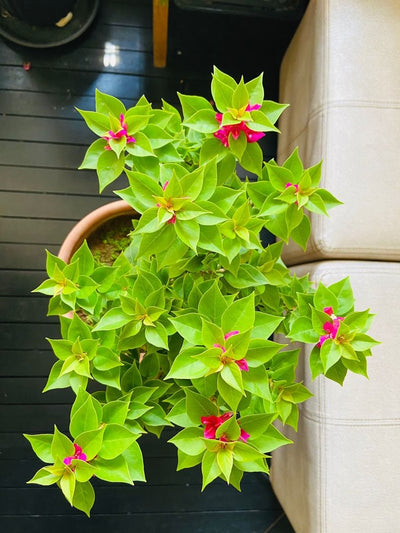Best Hanging Plants as an Indoor Plant
1. Pothos Plant Care and Growing Instructions

Pothos plants, also known as Devil's Ivy, are popular houseplants and also Hanging Plants that are easy to care for and can thrive in a variety of indoor environments. Here are some instructions on how to care for and grow a Pothos Hanging Plants :
- Light: Pothos Hanging plants can tolerate a wide range of light conditions, from low to bright indirect light. However, they prefer bright, indirect light and may produce more variegation in their leaves under these conditions.
- Water: Golden money plant prefer to dry out slightly between waterings, so water only when the top inch of soil feels dry to the touch. Overwatering can lead to root rot, so be sure not to let the plant sit in water for too long.
- Soil: Pothos Hanging Plants prefer well-draining soil that is rich in organic matter. A mixture of peat moss, per-lite, and vermiculite is a good choice.
- Temperature: Pothos plants prefer temperatures between 65-85°F (18-29°C) and can tolerate slightly cooler temperatures at night.
- Humidity: Pothos Hanging Plants can tolerate a range of humidity levels, but they will grow best in moderate to high humidity. You can increase humidity around the plant by placing a tray of water nearby or using a humidifier.
- Fertilizer: Pothos Hanging Plants benefit from regular fertilization during the growing season (spring and summer). Use a balanced, water-soluble fertilizer every 4-6 weeks.
- Propagation: Pothos Hanging Plants can be easily propagated by stem cuttings. Simply take a cutting with a few leaves and place it in water or soil until roots develop.
- Pruning: Money Hanging Plants can become quite long and leggy, so regular pruning is necessary to keep them looking full and bushy. Prune back any leggy stems or yellowing leaves to promote new growth.

By following these instructions, you should be able to keep your Pothos plant healthy and thriving for many years to come.We have available money plant hanging plants pot.
2. Grape Ivy: Indoor Hanging Plants Care and Growing Instructions
Grape ivy can be grown and cared for indoors all year. The vine grows slowly but can live for up to ten years with proper care, making it an excellent choice for long-term Hanging Plants care.

Grape Ivy Care
Popular Cissus species plants, such as grape ivy, are not particularly difficult to grow indoors. Unlike some other climbing Hanging Plants, such as philodendrons, they will readily climb whatever support they are given, so place them near a structure you don't mind climbing or provide them with food in your home (like on a bookcase). Even better, grape ivy is well-adapted to low light and will thrive indoors. With these benefits, it's surprising that the Hanging Plants isn't more popular indoors, but they're still difficult to find in many areas.
Grape ivy is a low-light vine that thrives in an east-facing window. It can also be grown well under lights, though because the vine only requires partial shade, this isn't always necessary. If you place your plant somewhere in your home that receives brighter or more consistent light, increase your watering accordingly.
Soil
Your grape ivy vine will thrive in a well-draining, aerated soil mixture, such as a mix of peat moss, bark, and perlite. A store-bought soil mixture formulated specifically for African violets will also suffice. Keep in mind that if you make your own peat moss mixture, it can be very acidic—adjust the pH level with something like dolomite to bring it closer to neutral.
Water
During the growing season, provide consistent water to your grape ivy to keep the soil moist (but not drenched). In the winter, reduce watering and allow the soil to dry between applications. Though they require a lot of water, grape ivy Hanging Plants are especially prone to root rot, so it's critical to plant them in the right soil and monitor their response to watering. If you notice the plant dropping leaves, it's probably because it's getting too much water.
Humidity and temperature
Grape ivy Hanging Plants prefer temperatures that are moderate and consistent, ranging from 68 to 82 degrees Fahrenheit. Anything that falls outside of this range can stymie the plant's growth and overall success. Furthermore, grape ivy vines require only average household humidity, making them suitable for almost any room in your home.
Fertilizer
Feed your grape ivy with a weak liquid fertilizer during the growing season, reducing both water and fertilizer during the winter months but not completely stopping growth.
Common Insects and Diseases
Scale insects, spider mites, and mealybugs attack Cissus vines, including grape ivy Hanging Plants . If you notice any signs of pest infestation on your plant, treat it immediately with an organic insecticide or horticultural cultural oil such as neem oil until all signs of pests have disappeared (this may take a few applications and several weeks).




Leave a comment